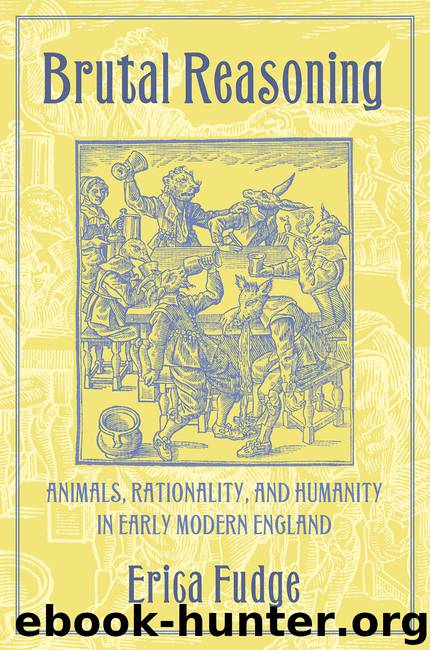Brutal Reasoning by Erica Fudge

Author:Erica Fudge
Language: eng
Format: epub
Publisher: CORNELL UNIVERSITY PRESS
Published: 2019-01-04T00:00:00+00:00
This cannot be simply understood as instigation to a sporting contest. Rather, there are, I think, three possible readings to be made. First, that the royal party merely wanted to see savagery in action, to see the lions dispatch the lamb. Second, the lowering of the lamb into the lions’ den might have been an attempt by the royal party to witness a moment of leonine kindness such as Daniel experienced (Daniel 6:22) with the lamb emblematic of that other Lamb of God. Third, while this amazing spectacle may have challenged expectations about the violence of the lions, it would have, perhaps, reinforced the belief in the divine power of the overseeing monarch to control nature. Whereas Daniel cried out to “the living God,” perhaps the lions’ kindness in 1605 could be offered as evidence of the presence of God’s representative on earth. Just as Charles I, twenty-eight years later, could offer protection to a hare, so James’s mere presence could put an end to the violence of animals. However, this kindness of the lions was brought to an abrupt end when another lion was brought in to the “walke” and was baited by dogs. Here, perhaps, we witness the “simpler” pleasure of combat.58 But this simpler pleasure, we should remember, is not the focus of the king’s visit; it is merely its epilogue.
Thus, in attempting to read the animals through the lens of preexisting narratives—the bestiary tradition, the Bible, and the belief in the monarch’s divine power—the animal combats witnessed by the king and other members of the royal family do not so much reveal the animals’ natural behavior as the preconceived ideas about animals held by the spectators. The framework of myth sits comfortably beside the spectators’ desire for spectacle and cruelty. Thus, what Stow and Howes record are in part human expectations and their realization (or otherwise) in the face of real animals. There are, at work in the Tower, narratives about ideal animals, and there are real animals; and the two are not always compatible.
So, when Scott-Warren argues that “The arena became a kind of psychological anatomy theater, revealing the courage, nobility, and artistry, the ‘peculiar or proper’ character of the animals that were exposed to the public gaze,” this does not fully reflect the context in which animals were seen.59 People looked at animals, without doubt, but they frequently did so with certain expectations of what animal nature would be. In fact, for many writers and observers those expectations constructed the meaning of the animals’ actions.
This is an early modern technique of reading animal behavior that directly contradicted ideas found in another classical tradition, and it is significant for us that these ideas—or the most coherent reproduction of them—were rediscovered during the sixteenth century and first printed in 1562. Sextus Empiricus’s Outlines of Scepticism offered early modern writers yet another way of thinking about animals. In the debates already covered in this chapter, animals were reasonable beings; were creatures capable of performing syllogisms; were beings
Download
This site does not store any files on its server. We only index and link to content provided by other sites. Please contact the content providers to delete copyright contents if any and email us, we'll remove relevant links or contents immediately.
| Ancient & Classical | Arthurian Romance |
| Beat Generation | Feminist |
| Gothic & Romantic | LGBT |
| Medieval | Modern |
| Modernism | Postmodernism |
| Renaissance | Shakespeare |
| Surrealism | Victorian |
4 3 2 1: A Novel by Paul Auster(12393)
The handmaid's tale by Margaret Atwood(7764)
Giovanni's Room by James Baldwin(7346)
Asking the Right Questions: A Guide to Critical Thinking by M. Neil Browne & Stuart M. Keeley(5775)
Big Magic: Creative Living Beyond Fear by Elizabeth Gilbert(5773)
Ego Is the Enemy by Ryan Holiday(5450)
The Body: A Guide for Occupants by Bill Bryson(5097)
On Writing A Memoir of the Craft by Stephen King(4944)
Ken Follett - World without end by Ken Follett(4733)
Adulting by Kelly Williams Brown(4574)
Bluets by Maggie Nelson(4556)
Eat That Frog! by Brian Tracy(4540)
Guilty Pleasures by Laurell K Hamilton(4449)
The Poetry of Pablo Neruda by Pablo Neruda(4109)
Alive: The Story of the Andes Survivors by Piers Paul Read(4033)
White Noise - A Novel by Don DeLillo(4011)
Fingerprints of the Gods by Graham Hancock(4004)
The Book of Joy by Dalai Lama(3986)
The Bookshop by Penelope Fitzgerald(3854)
